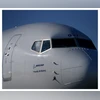By Julie Johnsson, Allyson Versprille and Madlin Mekelburg
Boeing Co. has completed an agreement with the US government to plead guilty to criminal conspiracy in connection with two fatal crashes of its 737 Max jetliner, setting the stage for a possible courtroom confrontation with relatives of those who were killed.
Boeing Co. has completed an agreement with the US government to plead guilty to criminal conspiracy in connection with two fatal crashes of its 737 Max jetliner, setting the stage for a possible courtroom confrontation with relatives of those who were killed.
Details of the plea deal were disclosed Wednesday in a federal court filing after weeks of talks between Boeing and the US Justice Department, which first revealed the agreement earlier this month. The case reflects efforts by the Biden Administration to balance new punishments for a reeling titan of US industry with demands by grieving families for retribution.
As part of its plea agreement, which requires approval from the Texas federal judge overseeing the case, Boeing faces a fine of at least $243.6 million. That matches the amount it paid under a 2021 deferred-prosecution agreement that the Justice Department later determined the company had violated, the filing showed.
The company also will serve three years on probation. During that time, Boeing agreed to install an independent corporate monitor and to spend at least $455 million to bolster its compliance and safety programs, according to the filing.
“We will continue to work transparently with our regulators as we take significant actions across Boeing to further strengthen our safety, quality and compliance programs,” a Boeing spokesperson said in a statement.
The planemaker initially avoided charges for concealing information from the Federal Aviation Administration over changes to a system in the 737 Max jet that led to two crashes in 2018 and 2019, killing 346 people. But in an unusual move, the Justice Department concluded in May that the company violated the 2021 deferred-prosecution deal — a move that occurred after the in-flight blowout of a fuselage panel on an Alaska Airlines 737 Max 9 jet on Jan. 5.
More From This Section
Anti-fraud compliance
According to the agreement, Boeing took considerable steps to enhance its anti-fraud compliance program as required by the 2021 deal, but the company ultimately failed to fully implement and test the program by the time the deal expired.
“As a result, the Department determined that Boeing’s anti-fraud compliance programme still has significant gaps,” according to the filing.
The government also determined that Boeing failed to adopt policies and procedures to limit risks from “out-of-sequence” work done to correct earlier assembly of its aircraft. Such corrective work is more difficult to perform and can increase the risk of defects, prosecutors said.
Between 2021 and 2023, Boeing conducted safety assessments that identified out-of-sequence work that could result in the delivery of “unairworthy” aircraft to customers, the Justice Department said in the filing.
“Boeing senior executives prioritised the movement of aircraft through Boeing’s factories over reducing out-of-sequence work to ensure production quality,” according to the filing.
Under the agreement, Boeing is required to provide the monitor with access to all information, documents, records, facilities and employees it needs to evaluate whether the company’s internal controls, record-keeping and policies are in compliance with US fraud laws.
The monitor’s role will include assessing “the Board of Directors’ and senior management’s commitment to, and effective implementation of, the corporate compliance program,” according to the filing. The monitor will prepare a confidential annual report for the government, with an executive summary being made available to public in the court docket, the government said.
Families
Attorneys for the families of the crash victims plan to urge the judge to reject the new agreement. According to a court filing earlier this month, the families said they intend to argue that the plea deal “unfairly makes concessions to Boeing that other criminal defendants would never receive and fails to hold Boeing accountable for the deaths of 346 persons.”
US District Judge Reed O’Connor, who is overseeing the case, has yet to decide if he’ll hold a hearing on the plea deal.
By agreeing to plead guilty, Boeing will avoid the distraction of a criminal trial at a time when its finances are in disarray and its leadership is in limbo. The company has been in crisis mode since the near-catastrophic Alaska Airlines accident.
The case is US v. Boeing, 21-cr-005, US District Court, Northern District of Texas (Fort Worth).

)